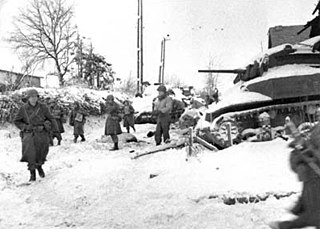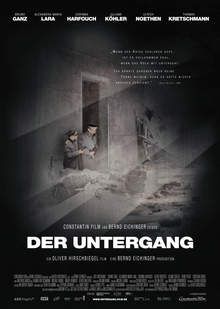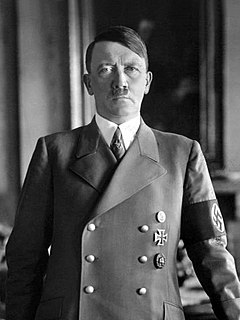
The German Empire, also known as Imperial Germany, was the German nation state that existed from the unification of Germany in 1871 until the abdication of Kaiser Wilhelm II in 1918.

Heinrich Luitpold Himmler was Reichsführer of the Schutzstaffel, and a leading member of the Nazi Party (NSDAP) of Germany. Himmler was one of the most powerful men in Nazi Germany and a main architect of the Holocaust.

Joseph Vissarionovich Stalin was a Georgian revolutionary and Soviet politician who led the Soviet Union from the mid–1920s until 1953 as General Secretary of the Communist Party of the Soviet Union (1922–1953) and Premier (1941–1953). Initially presiding over a collective leadership as first among equals, by the 1930s he was the country's de facto dictator. A communist ideologically committed to the Leninist interpretation of Marxism, Stalin helped to formalise these ideas as Marxism–Leninism, while his own policies became known as Stalinism.
May 2 is the 122nd day of the year in the Gregorian calendar. 243 days remain until the end of the year.

The Schutzstaffel was a major paramilitary organization under Adolf Hitler and the Nazi Party (NSDAP) in Nazi Germany, and later throughout German-occupied Europe during World War II. It began with a small guard unit known as the Saal-Schutz made up of NSDAP volunteers to provide security for party meetings in Munich. In 1925, Heinrich Himmler joined the unit, which had by then been reformed and given its final name. Under his direction (1929–45) it grew from a small paramilitary formation to one of the most powerful organizations in Nazi Germany. From 1929 until the regime's collapse in 1945, the SS was the foremost agency of security, surveillance, and terror within Germany and German-occupied Europe.

World War II, also known as the Second World War, was a global war that lasted from 1939 to 1945. The vast majority of the world's countries—including all the great powers—eventually formed two opposing military alliances: the Allies and the Axis. A state of total war emerged, directly involving more than 100 million people from over 30 countries. The major participants threw their entire economic, industrial, and scientific capabilities behind the war effort, blurring the distinction between civilian and military resources. World War II was the deadliest conflict in human history, marked by 50 to 85 million fatalities, most of whom were civilians in the Soviet Union and China. It included massacres, the genocide of the Holocaust, strategic bombing, premeditated death from starvation and disease, and the only use of nuclear weapons in war.

The Battle of Kursk was a Second World War engagement between German and Soviet forces on the Eastern Front near Kursk in the Soviet Union, during July and August 1943. The battle began with the launch of the German offensive, Operation Citadel, on 5 July, which had the objective of pinching off the Kursk salient with attacks on the base of the salient from north and south simultaneously. After the German offensive stalled on the northern side of the salient, on 12 July the Soviets commenced their Kursk Strategic Offensive Operation with the launch of Operation Kutuzov against the rear of the German forces in the northern side. On the southern side, the Soviets also launched powerful counterattacks the same day, one of which led to a large armoured clash, the Battle of Prokhorovka. On 3 August, the Soviets began the second phase of the Kursk Strategic Offensive Operation with the launch of Operation Polkovodets Rumyantsev against the German forces in the southern side of the Kursk salient.

Oskar Schindler was a German industrialist and a member of the Nazi Party who is credited with saving the lives of 1,200 Jews during the Holocaust by employing them in his enamelware and ammunitions factories in occupied Poland and the Protectorate of Bohemia and Moravia. He is the subject of the 1982 novel Schindler's Ark and its 1993 film adaptation, Schindler's List, which reflected his life as an opportunist initially motivated by profit, who came to show extraordinary initiative, tenacity, courage, and dedication to save the lives of his Jewish employees.

The Battle of the Bulge, also known as the Ardennes Counteroffensive, took place from 16 December 1944 to 25 January 1945, and was the last major German offensive campaign on the Western Front during World War II. It was launched through the densely forested Ardennes region of Wallonia in eastern Belgium, northeast France, and Luxembourg, towards the end of the war in Europe. The offensive was intended to stop Allied use of the Belgian port of Antwerp and to split the Allied lines, allowing the Germans to encircle and destroy four Allied armies and force the Western Allies to negotiate a peace treaty in the Axis powers' favor.

The UEFA European Championship is the primary association football competition contested by the senior men's national teams of the members of the Union of European Football Associations (UEFA), determining the continental champion of Europe. Held every four years since 1960, in the even-numbered year between World Cup tournaments, it was originally called the UEFA European Nations' Cup, changing to the current name in 1968. Starting with the 1996 tournament, specific championships are often referred to in the form "UEFA Euro [year]"; this format has since been retroactively applied to earlier tournaments.

Germany competed at the 2004 Summer Olympics in Athens, Greece, from 13 to 29 August 2004. This was the nation's fourth consecutive appearance at the Summer Olympics after its reunification in 1990. The German National Olympic Committee sent the nation's second largest delegation to the Games since its reunification. A total of 441 athletes, 250 men and 191 women, competed in 27 sports, and were nominated by DOSB at four different occasions.

Downfall is a 2004 German historical war drama film directed by Oliver Hirschbiegel from a screenplay by its producer, Bernd Eichinger. The film stars Bruno Ganz, Alexandra Maria Lara, Corinna Harfouch, Ulrich Matthes, Juliane Köhler, Heino Ferch, Christian Berkel, Matthias Habich, and Thomas Kretschmann. It is set during the Battle of Berlin in World War II, when Nazi Germany is on the verge of defeat, and depicts the final days of Adolf Hitler. It is based on the books Inside Hitler's Bunker by historian Joachim Fest and Until the Final Hour by Hitler's former private secretary Traudl Junge, among other accounts of the period.

The July Crisis was a series of interrelated diplomatic and military escalations among the major powers of Europe in the summer of 1914 that was the penultimate cause of World War I. The crisis began on June 28, 1914, when Gavrilo Princip, a Bosnian Serb, assassinated Archduke Franz Ferdinand, heir presumptive to the Austro-Hungarian throne. A complex web of alliances, coupled with miscalculations by many leaders that war was in their best interests or that a general war would not occur, resulted in a general outbreak of hostilities among almost every major European nation in early August 1914; every major European nation was involved by May 1915.

Adolf Hitler was a German politician and leader of the Nazi Party. He rose to power as Chancellor of Germany in 1933 and later Führer in 1934. During his dictatorship from 1933 to 1945, he initiated World War II in Europe by invading Poland in September 1939. He was closely involved in military operations throughout the war and was central to the perpetration of the Holocaust.

World War I, also known as the First World War or the Great War, was a global war originating in Europe that lasted from 28 July 1914 to 11 November 1918. Contemporaneously described as "the war to end all wars", it led to the mobilisation of more than 70 million military personnel, including 60 million Europeans, making it one of the largest wars in history. It is also one of the deadliest conflicts in history, with an estimated nine million combatants and seven million civilian deaths as a direct result of the war, while resulting genocides and the 1918 influenza pandemic caused another 50 to 100 million deaths worldwide.

Operation Overlord was the codename for the Battle of Normandy, the Allied operation that launched the successful invasion of German-occupied Western Europe during World War II. The operation was launched on 6 June 1944 with the Normandy landings. A 1,200-plane airborne assault preceded an amphibious assault involving more than 5,000 vessels. Nearly 160,000 troops crossed the English Channel on 6 June, and more than two million Allied troops were in France by the end of August.

The Holocaust, also known as the Shoah, was a genocide during World War II in which Nazi Germany, aided by local collaborators, systematically murdered some six million European Jews—around two-thirds of the Jewish population of Europe—between 1941 and 1945. Jews were targeted for extermination as part of a larger event during the Holocaust era, in which Germany and its collaborators persecuted and murdered other groups, including Slavs, the Roma, the "incurably sick", political and religious dissenters such as communists and Jehovah's Witnesses, and gay men. Taking into account all the victims of Nazi persecution, the death toll rises to 17 million.
National Socialism, more commonly known as Nazism, is the ideology and practices associated with the Nazi Party – officially the National Socialist German Workers' Party – in Nazi Germany, and of other far-right groups with similar aims.
















